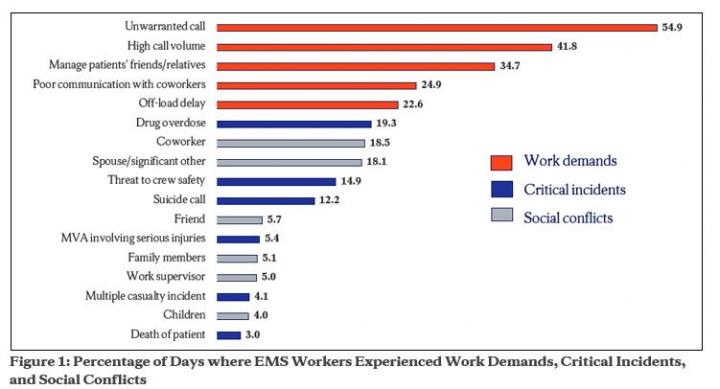
Credit: Syracuse University Lerner Center for Public Health Promotion.
Syracuse, N.Y. – Emergency medical service (EMS) workers face triple the risk for significant mental health problems such as depression and posttraumatic stress disorder compared to the general population, according to a recently published study by researchers from Syracuse University.
The study also showed that daily mental health symptoms for EMS workers can be reduced through recovery activities such as exercising, socializing with other people, and finding meaning in the day’s challenges.
The study, “Dynamic psychosocial risk and protective factors associated with mental health in Emergency Medical Service (EMS) personnel,” was published recently by the Journal of Affective Disorders. The study is also summarized in the Lerner Center for Public Health Promotion research brief “How Do Emergency Medical Service Workers Cope with Daily Stressors?”
The COVID-19 pandemic has underscored the significant mental health burden experienced by EMS workers. The researchers surveyed EMS workers at American Medical Response in Syracuse, N.Y., for eight consecutive days in 2019 to better understand their mental health symptoms related to daily occupational stressors. These stressors can take the form of routine work demands, critical incidents involving serious harm or death, and social conflicts.
“Together, these occupational stressors negatively impacted mental health each day that they occurred,” said researcher Bryce Hruska. “Each additional work demand or critical event that an EMS worker encountered on a given workday was associated with a 5% increase in their PTSD symptom severity levels that day, while each social conflict was associated with a 12% increase in their depression symptom severity levels.”
The research team was led by Hruska, a Lerner Faculty Affiliate and assistant professor of public health at Syracuse University’s David B. Falk College of Sport and Human Dynamics. Here are the team’s key findings:
- EMS workers experience a diverse array of occupational stressors each day.
- These stressors are associated with an elevation in mental health symptoms each day that they occur.
- Recovery activities (like exercising or socializing with other people) and looking for meaning in the day’s stressors may protect mental health.
The study found that on workdays, the EMS workers engage in approximately three recovery activities during non-work hours, mostly visiting with friends and family, eating a meal with others, and spending quiet time alone.
“These activities had a beneficial impact on mental health; each additional recovery activity in which a worker engaged was associated with a 5% decrease in their depression symptom severity levels that day,” Hruska said. “The social nature of the reported recovery activities is notable, given that healthy relationships can alleviate the negative impact of stress on mental health by assisting with coping efforts and helping to reframe the day’s stressors.
“Perhaps demonstrating this latter effect, we also found that EMS workers who looked for lessons to learn from the day’s challenges experienced a 3% decrease in their daily depression symptoms,” Hruska added.
The researchers identified several actionable strategies that build upon the protective behaviors in which the EMS workers naturally engaged and could make some work events less stressful. Here are some instances noted in the study:
- Developing or refining communications strategies may be helpful for alleviating the stress associated with managing patients’ family and friends and interacting with co-workers.
- Recognizing conflicts as an opportunity for learning and growing may be a useful tactic for effectively resolving the situation with fewer negative mental health effects.
- Taking time to recharge after a particularly demanding shift offers an opportunity to let emotions cool. For example, when EMS workers respond to a critical event, scheduled downtime may offer an opportunity for recovery and processing of the day’s events.
###
Support for this research was provided by professional development funds from the David B. Falk College of Sport and Human Dynamics.
Media Contact
Matthew Michael
[email protected]




